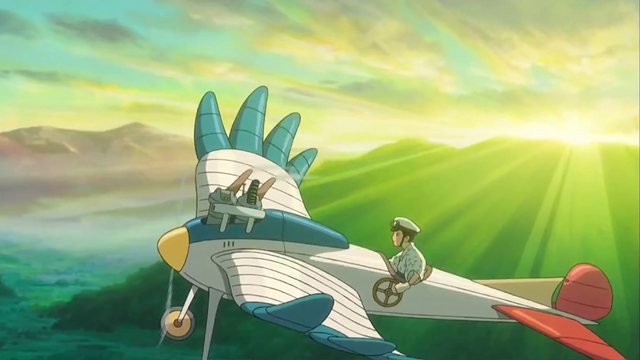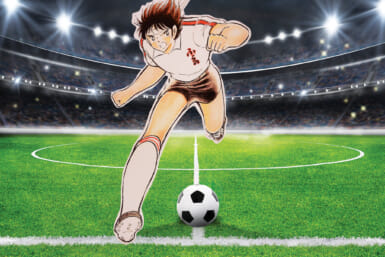Hayao Miyazaki’s final film The Wind Rises has been nominated in the Best Animated Feature category at this year’s upcoming Academy Awards to be held on March 2. With this being the legendary animator’s swan song, what are the chances of the silver-haired director ending his career by adding a second Oscar to his trophy cabinet?
By Christopher O’Keeffe
On first look at the nominees, it seems Miyazaki is up with a good chance against his rivals: the 3D, computer-animated The Croods, Despicable Me 2, Frozen, and France’s Ernest and Celestine. Dreamwork’s ‘The Croods’ and Universal’s ‘Despicable Me 2’ have received generally positive reviews, but being good, solid family entertainment may not be enough to see them walk away with the award. Disney’s Frozen is perhaps the best of the bunch, being critically lauded and seen as a return to past form for Disney. The fact that all these films are rendered in 3D give them—at least on the surface—a similar look and feel that may result in voters leaning towards Miyazaki’s gorgeously drawn finale. But in past years the CG work of the majors does tend to fare better over stop-motion and more traditionally animated features, with Brave and Rango winning in the previous two years over the likes of the arguably more interesting Frankenweenie and Chico and Rita. While we’ll have to wait until March before we can get a look at Frozen in Japan, if it doesn’t have the emotional impact and cross-generational appeal of past winners, such as Pixar’s Up, it will struggle to walk away with the statuette.
As the film is now being seen on screens overseas, the controversy is spreading.
Ernest and Celestine could be the dark horse of the category, but lacking the marketing push that films from the major studios can muster, it has been seen by far fewer people. The hand-drawn style and water-colored animation set this French-Belgian effort apart and may just give it an edge over the more typical fare. That being said, French animations are regularly nominated for the award but have yet to manage a win with The Illusionist and A Cat in Paris losing out in 2010 and 2011 respectively.
Miyazaki’s feature itself has received mostly positive reviews, with many critics singling out the ambition of the project for tackling a subject not often covered in mainstream animation, but many critics have said that it is not Miyazaki’s best. The question which lingers is, will Miyazaki win the award simply because it is his last film, an award for services rendered, rather than for the film itself? It would be disingenuous to suggest that the film isn’t worthy of merit on its own account. It’s an impressive work in its own right and deserves its place amongst the nominees, but the Academy does lean towards sentimentality and this would be a fitting chance to honor the career of an exceptional filmmaker. Academy history is scattered with examples of artists winning for what perhaps isn’t their best work, with many feeling they received the awards simply for the fact that they were long overdue. Al Pacino taking Best Actor for Scent of a Woman over his seminal performances of the 70s, The Lord of the Rings losing out in all the major categories until its final installment The Return of the King cleaned house in 2003, and Alfred Hitchcock not winning an award in six attempts and having to settle for a memorial award in 1968 could all be seen as examples of the Academy awarding the artist rather than the work at hand. This isn’t Miyazaki’s first Academy win though—he picked up the Oscar in 2002 for Spirited Away, first bringing Studio Ghibli to mainstream attention—and so the Academy may not feel it is essential to award him this time around.
The question which lingers is, will Miyazaki win the award simply because it is his last film, an award for services rendered, rather than for the film itself?
One final factor that may affect The Wind Rises’ chances, or may cloud the celebrations if it does manage to win, is the controversy which has surrounded the film, both at home and abroad since its release. The film follows a fictionalized account of the life of aircraft designer Jiro Hiroshi whose creations would be used to devastating effect in World War II. It is a strange topic in some ways for an animated film, especially one from someone who has famously spoken out on pacifist beliefs. Miyazaki does however have a well-documented love of flying and flying machines, which appear in many of his films, and it makes sense for the artist to pay tribute to someone he clearly respected in his final film. The film drew criticism in Japan as the left questioned the ethics of telling the story of a man who made war planes and the right were presumably unhappy that they didn’t get to see animated depictions of Zero fighter planes decimating their enemies. As the film is now being seen on screens overseas, the controversy is spreading. Expect some interesting discussions to arise if it is victorious.
Miyazaki’s film is impressive in scale and ambition as well as being visually stunning. It makes a fitting end to a phenomenal career, and if the chance to honor one of the greatest animators of all time proves too much for the Academy to pass up, Hayao Miyazaki could once again lift the film world’s most prized trophy on Oscar night.









